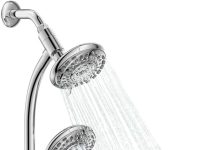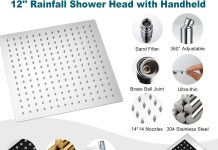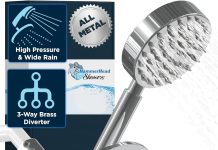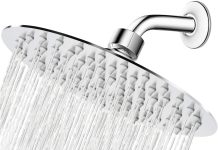When it comes to choosing the suitable material for a showerhead, it can be pretty overwhelming with the numerous options available.
From plastic to metal and everything in between, each material has its own pros and cons. In this article, we will explore the different materials used in shower heads and help you determine which one is best suited for your needs.
So, whether you’re looking for a durable option or prioritizing aesthetics, we’ve got you covered. Let’s find out which material reigns supreme in shower heads.
Table of Contents
Plastic Shower Heads
Advantages of Plastic Shower Heads
Plastic shower heads have several advantages, making them a popular choice for many homeowners. Firstly, they are lightweight and easy to install. This makes them convenient for those who prefer to do DIY projects around the house. Plastic shower heads are also generally more affordable than their metal counterparts, which is an attractive feature for budget-conscious individuals.
Another advantage of plastic shower heads is that they are resistant to corrosion. Unlike metal shower heads, which can rust over time, plastic shower heads are not prone to this issue. This means that they have a longer lifespan and require less maintenance. Additionally, plastic shower heads are usually available in various colors and designs, allowing homeowners to find one that matches their bathroom decor.
Disadvantages of Plastic Shower Heads
Despite their benefits, plastic shower heads also have a few disadvantages. One major drawback is their durability. Plastic is not as strong as metal; thus, plastic shower heads are more prone to cracking or breaking, especially if subjected to high water pressure. Furthermore, plastic shower heads may not provide the same water flow and pressure level as metal shower heads.
Another disadvantage of plastic shower heads is that they are less aesthetically pleasing than their metal counterparts. While they come in different colors and designs, the overall appearance may not be as luxurious or high-end as metal shower heads. Additionally, some people are concerned about using plastic in their bathrooms due to potential environmental implications.
Metal Shower Heads
Advantages of Metal Shower Heads
Metal shower heads offer several advantages, particularly those made of stainless steel, brass, chrome, copper, bronze, and plated materials. One notable advantage is their durability. Metal shower heads are built to withstand the test of time and are less likely to crack or break. They can handle high water pressure without issues, ensuring a consistent and satisfying shower experience.
Another advantage of metal shower heads is their ability to provide a luxurious and sophisticated look to any bathroom. The shiny and polished surface of metal shower heads adds an elegant touch and enhances the overall aesthetics of the space. Furthermore, metal shower heads are available in various finishes, giving homeowners more options to match their bathroom decor.
In terms of performance, metal shower heads offer excellent water flow and pressure. They are often equipped with different spray settings, allowing individuals to customize their shower experience according to their preferences. Moreover, metal shower heads are easy to clean and maintain, as they are less prone to staining or discoloration.
Disadvantages of Metal Shower Heads
While metal shower heads have numerous advantages, they also have disadvantages. One significant drawback is their weight. Metal shower heads are usually heavier than plastic ones, making installation more challenging. It may require additional support or reinforcement to attach it to the shower arm securely.
Another disadvantage of metal shower heads, particularly those made of brass or copper, is their potential for corrosion. Over time, these metals can develop patina or tarnish, which may affect their appearance. Regular cleaning and maintenance are necessary to prevent the build-up of mineral deposits that can impact water flow.
Additionally, metal shower heads, especially those made of brass or bronze, can be more expensive compared to plastic options. This higher price point may deter some individuals on a tight budget.
Stainless Steel Shower Heads
Advantages of Stainless Steel Shower Heads
Stainless steel shower heads are highly regarded for their durability and longevity. This corrosion-resistant material makes it an excellent choice for hard water or high-humidity areas. Stainless steel shower heads can withstand years of use without showing wear or degradation.
Another advantage of stainless steel shower heads is their aesthetic appeal. The sleek and modern stainless steel look adds a touch of sophistication to any bathroom. The material is available in various finishes, such as brushed or polished, allowing homeowners to select the one that best complements their bathroom decor.
In terms of performance, stainless steel shower heads offer excellent water flow and pressure. They are designed to provide a satisfying shower experience, with options for adjustable settings to suit individual preferences. Moreover, stainless steel is easy to clean and maintain, as it is resistant to stains and mineral deposits.
Disadvantages of Stainless Steel Shower Heads
One prominent disadvantage of stainless steel shower heads is their higher cost than plastic options. Stainless steel is a premium material, and its price reflects the quality and durability it offers. This may be a limiting factor for those on a tight budget.
Additionally, stainless steel shower heads can be heavier than their plastic counterparts. This may require extra care during installation to ensure proper support and prevent accidents.
Brass Shower Heads
Advantages of Brass Shower Heads
Brass shower heads are popular due to their durability and aesthetic appeal. Brass is a highly durable material that can withstand the test of time. It is corrosion-resistant, making it suitable for hard water or high-humidity areas. This means brass shower heads are less likely to develop mineral deposits or rust, ensuring long-lasting and reliable performance.
Another advantage of brass shower heads is their ability to add a touch of elegance to any bathroom. The golden hue of brass imparts a sense of luxury and sophistication, making it an ideal choice for those seeking a more opulent shower experience. Furthermore, brass shower heads are available in various designs and finishes, allowing homeowners to find one that perfectly matches their bathroom decor.
In terms of performance, brass shower heads offer excellent water flow and pressure. They often have different spray settings, including rainfall, massage, or eco-friendly options. This allows individuals to customize their shower experience according to their preferences.
Disadvantages of Brass Shower Heads
One disadvantage of brass shower heads is their relatively higher cost than plastic. Brass is a premium material, and its price reflects the quality and durability it provides. Therefore, individuals with limited budgets may hesitate to choose brass for their shower heads.
Another potential drawback is the maintenance required for brass shower heads. While brass is highly resistant to corrosion, it can develop patina or tarnish over time. Regular cleaning and polishing are necessary to maintain its shine and to prevent mineral deposits from affecting water flow.
Chrome Shower Heads
Advantages of Chrome Shower Heads
Chrome shower heads are widely popular due to their versatility and affordability. Chrome is a highly reflective material that seamlessly combines bathroom styles and decors. Whether the bathroom design is modern, traditional, or minimalist, a chrome shower head can effortlessly complement the overall aesthetics.
One significant advantage of chrome shower heads is their affordability. They are generally more budget-friendly than other metal options, such as stainless steel or brass. This makes chrome suitable for those who want an elegant and durable showerhead without breaking the bank.
Additionally, chrome shower heads are known for their low maintenance requirements. The smooth and glossy surface of chrome is resistant to staining and discoloration. This means that it requires minimal effort to keep it clean and maintain its shine.
Disadvantages of Chrome Shower Heads
Despite their advantages, chrome shower heads have a few drawbacks. One potential disadvantage is their durability. Chrome is susceptible to scratching or peeling over time, mainly if abrasive cleaning agents or rough materials are used. This can affect the appearance and longevity of the shower head.
Another disadvantage of chrome shower heads is their water-spotting tendency. The reflective surface of chrome can make water spots more visible, which may require regular wiping or cleaning to maintain its shine.
Copper Shower Heads
Advantages of Copper Shower Heads
Copper shower heads offer several advantages, making them a desirable choice for homeowners. Firstly, copper is a highly durable material that can withstand years of use without showing signs of wear or corrosion. It is resistant to rust and tarnishes, making it suitable for hard water or high-humidity areas.
One notable advantage of copper shower heads is their unique and rustic appearance. The reddish-brown hue of copper adds character and warmth to any bathroom. Over time, copper develops a natural patina that enhances its aesthetic appeal, giving it an antique and authentic look.
In terms of performance, copper shower heads provide excellent water flow and pressure. They are often equipped with adjustable spray settings to cater to individual preferences. Moreover, copper has natural antimicrobial properties, making it a hygienic choice for a showerhead.
Disadvantages of Copper Shower Heads
One disadvantage of copper shower heads is their relatively higher cost than plastic alternatives. Copper is an expensive material, and its price reflects the quality and durability it offers. Therefore, individuals with limited budgets may need to consider other options.
Another potential drawback of copper shower heads is their maintenance. While copper is corrosion-resistant, it can develop a patina over time. Some homeowners may prefer copper’s aged and rustic appearance, while others may prefer to keep it polished and shiny. Regular cleaning and maintenance are necessary to preserve the desired appearance.
Bronze Shower Heads
Advantages of Bronze Shower Heads
Bronze shower heads are renowned for their durability and classic appeal. Bronze is a highly durable material that can withstand the test of time. It is corrosion-resistant, making it suitable for hard water or high-humidity areas. This means that bronze shower heads are less likely to develop mineral deposits or rust, ensuring a long-lasting and reliable performance.
One significant advantage of bronze shower heads is their timeless and elegant appearance. The deep, rich brown color of bronze adds a touch of sophistication to any bathroom. Bronze shower heads often have intricate designs and detailing, making them a centerpiece in the shower space.
In terms of functionality, bronze shower heads offer excellent water flow and pressure. Many models come with adjustable spray settings, allowing users to customize their shower experience. Additionally, bronze has natural antimicrobial properties, adding an extra layer of cleanliness to the shower head.
Disadvantages of Bronze Shower Heads
One potential disadvantage of bronze shower heads is their higher cost than plastic options. Bronze is a premium material, and its price reflects the quality and durability it provides. Therefore, individuals with limited budgets may need to consider other alternatives.
Another consideration is the maintenance required for bronze shower heads. While bronze is highly resistant to corrosion, it can develop a patina over time. Regular cleaning and polishing are necessary to maintain its shine and desired appearance.
Plated Shower Heads
Advantages of Plated Shower Heads
Plated shower heads offer a cost-effective way to achieve the look of more expensive metals without the higher price tag. Plated shower heads are typically made from a base material, such as plastic or brass, and then coated with a thin metal layer, such as chrome or brushed nickel. This coating gives the shower head the appearance of the desired metal finish without the total cost.
One significant advantage of plated shower heads is their affordability. They are generally less expensive than solid metal shower heads, making them a practical choice for those on a budget. Plated shower heads still provide the aesthetic appeal of metal finishes, allowing homeowners to achieve the desired look without compromising style.
Additionally, plated shower heads are relatively lightweight compared to solid metal options. This makes installation more accessible and more convenient, especially for those who prefer to do DIY projects around the house.
Disadvantages of Plated Shower Heads
One potential disadvantage of plated shower heads is their durability. The thin layer of metal plating may wear off over time, revealing the base material underneath. This can impact the appearance and longevity of the shower head.
Another consideration is the maintenance required for plated shower heads. The metal plating may be more susceptible to scratching or peeling than solid metal options. It is essential to use gentle cleaning agents and non-abrasive materials to avoid damaging the plating.
Acrylic Shower Heads
Advantages of Acrylic Shower Heads
Acrylic shower heads offer several advantages, making them a popular choice for homeowners. Firstly, acrylic is lightweight, making the shower heads easy to handle and install. This is especially beneficial for those who prefer to do DIY projects or need to replace their shower head regularly.
Another advantage of acrylic shower heads is their affordability. They are generally more cost-effective than metal shower heads, making them an attractive option for budget-conscious individuals. Acrylic shower heads also come in various colors and designs, allowing homeowners to find one that matches their bathroom decor.
In terms of maintenance, acrylic shower heads are relatively low-maintenance. They are resistant to staining and discoloration, making them easy to clean and keep looking new. Acrylic shower heads are also less prone to corrosion, ensuring a longer lifespan and minimal maintenance requirements.
Disadvantages of Acrylic Shower Heads
While acrylic shower heads have advantages, they also have disadvantages. One major drawback is their durability. Acrylic is not as strong as metal, and therefore, acrylic shower heads are more prone to cracking or breaking, especially if subjected to high water pressure. Extra care must be taken during installation and handling to prevent any damage.
Another disadvantage of acrylic shower heads is their lower water flow and pressure than metal options. This may not provide the same invigorating shower experience that some individuals prefer.
Additionally, acrylic shower heads may not have the same visual appeal as their metal counterparts. While they come in different colors, the overall appearance may not be as luxurious or high-end as metal shower heads. Some individuals may also have concerns about the environmental impact of using acrylic in their bathroom.
Composite Shower Heads
Advantages of Composite Shower Heads
Composite shower heads offer several advantages, making them a viable option for homeowners. Firstly, composite materials are lightweight, making the shower heads easy to handle and install. This is especially beneficial for those who prefer to do DIY projects or need to replace their shower head regularly.
Another advantage of composite shower heads is their durability. Composite materials are designed to be solid and resistant to cracking or breaking. They can withstand high water pressure without issues, ensuring a reliable performance.
In terms of maintenance, composite shower heads are relatively low-maintenance. They are resistant to staining and discoloration, making them easy to clean and maintain their appearance. Composite shower heads are also less prone to corrosion, ensuring a longer lifespan and minimal maintenance requirements.
Disadvantages of Composite Shower Heads
While composite shower heads have advantages, they also have a few disadvantages. One potential drawback is their limited design options. Compared to metal shower heads, composite shower heads may not offer as many choices in terms of colors or finishes. This may limit the ability to match the shower head with the bathroom decor.
Another potential disadvantage is the concern about the environmental impact of composite materials. Some individuals may prefer to avoid using composite materials in their bathroom due to the potential for harmful chemicals or unsustainable manufacturing processes.
Additionally, composite shower heads may not provide the same water flow and pressure level as metal options. This may impact the shower experience for those who prefer a more invigorating water flow.
In conclusion, the choice of material for a shower head depends on various factors such as budget, aesthetics, durability, and performance. Plastic shower heads offer affordability and resistance to corrosion, but they may lack the durability and aesthetic appeal of metal options. Metal shower heads, mainly stainless steel and brass, provide excellent durability, aesthetics, and water flow, but they can be more expensive.
Plated shower heads offer a cost-effective way to achieve the appearance of more expensive metals, such as chrome or brushed nickel. Acrylic and composite shower heads are lightweight and relatively low-maintenance, but they may lack the same level of durability and visual appeal as metal options.
Ultimately, the best material for a showerhead depends on individual preferences and priorities. It is essential to consider factors such as budget, desired aesthetics, durability, maintenance requirements, and water flow before deciding.
By weighing the advantages and disadvantages of each material, homeowners can choose a shower head that meets their specific needs and enhances their shower experience.






















